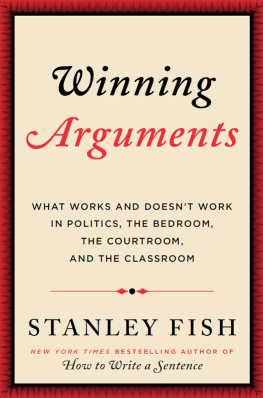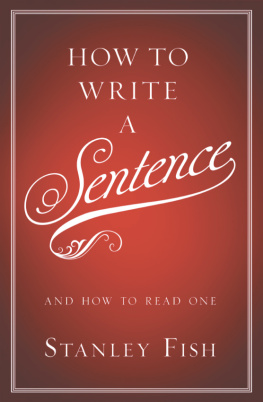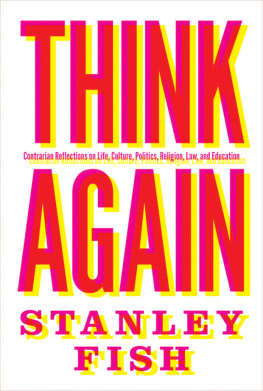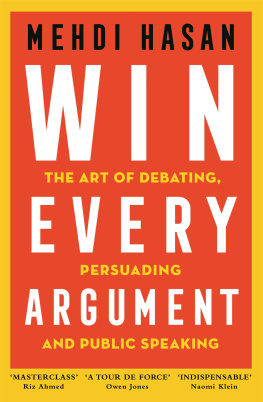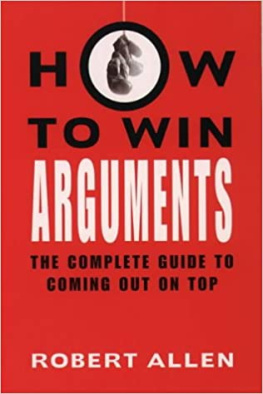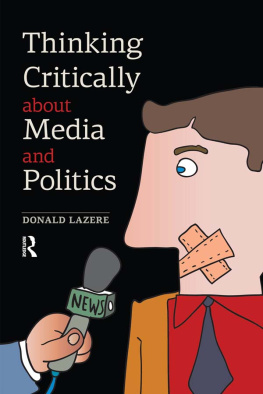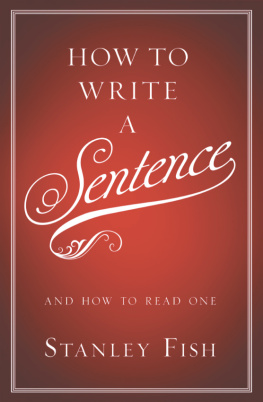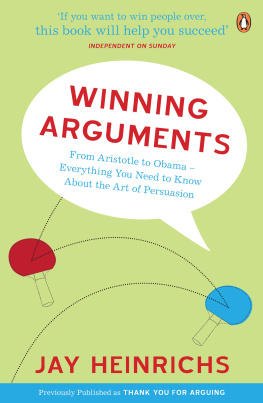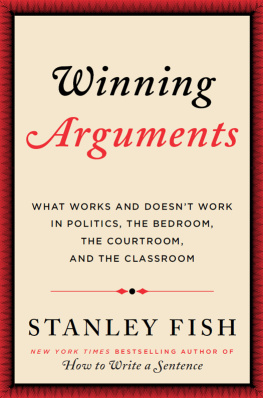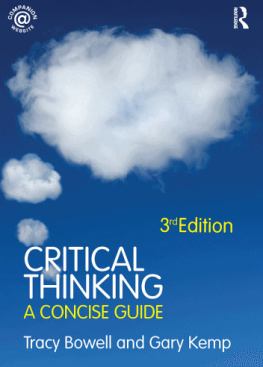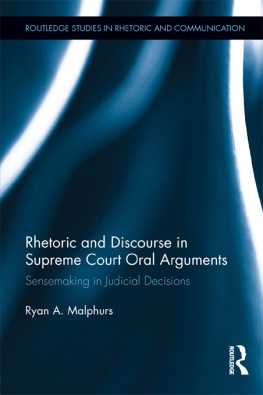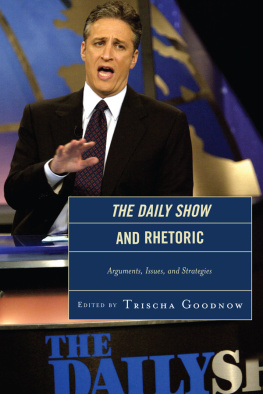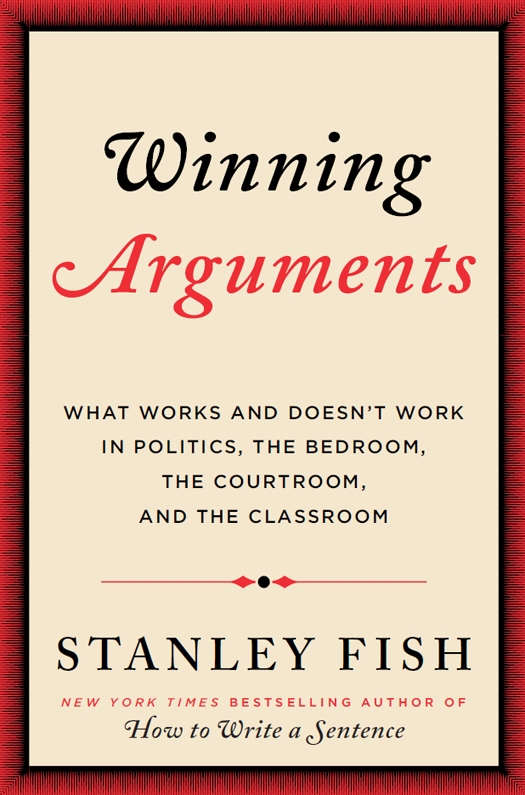To the memory of Richard Rorty, 19312007.
There is no such thing as non-discursive access to truth.
THIS BOOK TRIES to do two things that might seem to pull against each other, but in the end I dont think they do.
The first thing this book tries to do is explain how argument works in different contexts. Say youre a politician, and you want to persuade people to vote for you. What kind of arguments can you make and what arguments might you do better to avoid? Or suppose you areas almost everyone isin a long-term domestic relationship fraught with tensions, some out in the open, others simmering just below the surface. Is there any way of making your case that doesnt increase the tensions rather than damping them down? Or say you find yourself in court. What arguments will a judge allow you to make and what arguments will be ruled inadmissible, not because they are bad arguments, but because the judicial system doesnt recognize them as appropriately legal? Or suppose you are a college teacher eager to advance in the profession by making arguments that will be compelling to your peers. There are any number of things you might say about the materials you are analyzing, but how do you know which of the things you might say will win you points in the game, and which will mark you as a nonserious player?
These are questions with answers, and you will find them in the pages that follow. But even as I go about supplying those answers, I am also engaged in another project, not quite parallel, but not unrelated either. I am making an argument about argument and its relationship to the human condition. Basically, argument is the medium we swim in, whether we want to or not. Argument, the clash of opposing views, is unavoidable because the state of agreement that would render argument unnecessarya universal agreement brought about by facts so clear that no rational being could deny themis not something we mortals will ever achieve. Each of us occupies a partial, time-bound perspective and none of us has access to the Gods-eye view from which the big picture might be seen at a glance. Therefore any statement any of us makes is an argument because, as an assertion that proceeds from an angle, it can always be, and almost always will be, challenged by those whose vision is also angled, but differently so. Conflict, not agreement, is the default condition of mortality.
What this means is that knowledge and truth rather than presiding over the field of argument are what emerge in the course of argument; and because it is argument and not Reality with a capital R that produces them, truth and knowledge are always in the process of being renegotiated. There is no end, no stopping point, to this process and there is no end tono resolution ofargument.
Many people do not wish to believe this. They believe in the possibility of identifying something that will neutralize argument, stop its vertigo, tame ita common ground or an impersonal algorithm that will stand to the side of argument and supply a safe oasis of rest and consent. These dreamers emerge in every age, and offer a new (or apparently new) version of a very old project: let us, they say, refine and reform our language practices and develop a way of speaking and writing that has filtered out bias and prejudice in advance; then we will only be able to speak truth because the instrument we employ admits nothing else. Conflict will cease and argument can be retired or turned into a performance art.
To which I say: lots of luck, forget about it (but no one will) and learn to live with what we are and what we have. We are limited creatures who can only see through a glass darkly, and will never experience a face-to-face encounter with the Real; that encounter may await us in another life, but not in this one. In this one we look and see and talk and hope that by talking we can win others over to our side, which will always be a side, even when we proclaim it the full and complete truth. In short, we argue.
So repeat after me: argument is everywhere, argument is unavoidable, argument is interminable, argument is all we have.
Words Make the World
IN A FAMOUS Monty Python sketch called The Argument Clinic, a man played by Michael Palin enters an office and says to the receptionist, Id like to have an argument, please. What is odd about this request is that it doesnt specify what the argument is to be about. Any topic, it seems, will do, and as it turns out, no topic is put on the table, for Palin and his interlocutors (he is shunted from office to office) never proceed beyond arguing about what is and is not an argument. But of course that is a topic and, in the absence of some more substantive disagreement, it becomes substantive itself; the argument about argument fills the argumentative space and acquires a momentum of its own, and that momentum is uncontrollable.
The Palin character tries to control it and get a secure footing by putting a limit on the form argument can take. He objects that one of his argument partners (played by John Cleese) is not really arguing but just contradicting: An argument, he insists, is a connected series of statements intended to establish a proposition, while a contradiction is just the automatic gainsaying of any statement the other person makes. The reply is brief and brilliant: No it isnt. Or, in other (and more) words, You say that contradiction can be cleanly distinguished from argument, but I refute your pointthat is, argue against itsimply by denying it and thereby putting both of us in the position of having to give reasons; you now have to explain why contradiction has no place in the field of argument, and I have to explain why contradiction can be a move in the argument game, as I have just demonstrated it is; so there! The amount of words I have had to expend in order to gloss No it isnt is testimony to the wonderful conciseness of the Cleese characters retort.
This sketch teaches (at least) three lessons: (1) You cant just engage in argument in the abstract. An abstract argumentan argument where there is nothing at stake and you are just practicing the formis what the Palin character asks for, but before he knows it he is enmeshed in a very specific argument (about argument) and the cool distance he affects when announcing Id like to have an argument, please gives way quickly to the exasperation that always attends the real thing. (2) You can neither avoid argument when it is offered to you nor extricate yourself from it on your terms. When the Palin character grows tired of the game and says, Ive had enough of this, his partner-in-agon replies, No you havent, and it begins all over again. (3) You cannot manage argument. The career of argument is always running ahead of the intentions and desires of those who engage in it; as an arguer youre always playing catch-up, trying to deal with the twists and turns you had not anticipated.
A fourth, more overarching, lesson follows from the first three. There are no general strategies for conducting an argument because the specific something arguments are always about will always be embedded in a social or institutional setting in relation to which some, but not all, strategies will be relevant and, at least potentially, effective. In the political arena, one tried-and-true strategy is to smear or swift boat your opponent, accusing him or her of all manner of crimes, lies, betrayals, indecencies, improprieties, and failures of judgment. But if you do that in an academic argumentan argument between two scholars about the interpretation of a poem or the correct account of a historical eventyou might be rebuked and sent away because you will have flouted the decorum of the academic game. The ways of argument are context-specific, and while there are surely some general things to be said about argument, and an entire intellectual tradition called rhetoric dedicated to saying them, in the end the study of argument will be a study of the various contexts in which one encounters argument in its various forms.

